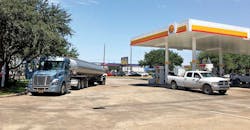Texas fuel haulers slowly restore operations in the wake of Hurricane Harvey
IN the days following Hurricane/Tropical Storm Harvey, fuel haulers made good progress restoring refined product distribution across most of the Texas Gulf Coast. The notable exception was the Beaumont-Port Arthur area, which was hit with severe flooding from more than 20-inches of Harvey-generated rain on August 29 and overnight.
Well over 50 inches of rain fell across the Houston area, and more than six million people were impacted as the storm stretched across 50 Texas counties.
Once the massive storm eased, fuel haulers in the Houston area began pulling loads of gasoline and diesel out of Kinder Morgan and Motiva terminals in Pasadena, Texas. Early shipments were limited, but volumes have now increased substantially. Flooded roads are still limiting access to c-stores, truck stops, and fueling locations.
In the immediate aftermath of the storm on August 29, Bulk Transporter was able to contact a few of the fuel haulers in Houston and surrounding areas, and this is what they had to say:
Texas TransEastern (TTE), Pasadena, Texas—The petroleum hauler has 130 drivers and 65 petroleum transports operating out the headquarters terminal in Pasadena. The corporate office was not damaged by the storm, and roads in the area are accessible. As of August 29, management had contacted more than 75% of the Houston-based employees, most of whom were fortunate to come through the storm in reasonably good shape.
“Before Harvey hit Houston, we tried to deliver as much gasoline as we could to our Houston-area customers,” says JJ Isbell, president of Texas TransEastern. “We also brought some loads from San Antonio (Texas) for power companies in the Houston area. In addition, some fully loaded transports have been staged at Houston-area hospitals.
“Some of our drivers got caught out in the storm. We are putting drivers and other employees in hotels as needed.”
Of Texas TransEastern’s 11 fleet locations, nine are in Texas; three are in Louisiana; two are in Mississippi; and one is in Arkansas. “Most of our locations are operational,” Isbell says.
Before Hurricane Harvey made landfall in South Texas, the carrier sent loaded transports from the Corpus Christi terminal to San Antonio and put up drivers in hotels. After the storm moved through, the transported returned to Corpus Christi, delivering the fuel to customers along the way.
Isbell cautioned that supply will continue to be an issue for quite some time. With much of the Gulf Coast refining capacity shut down, it will be quite some time before all of the plants are back on line. Texas TransEastern is already hauling refined fuels from supply points in Arkansas and Oklahoma to meets demand in the Dallas-Fort Worth, Texas, area.
“We’ll get through this,” he says. “Each of these storms is different, and we learn from each of them. Our response efforts continue to get better.
Mission Petroleum Carriers Inc, Houston, Texas: The refined fuels and crude hauler has 185 petroleum transports operating from seven terminals from North Dallas to Harlingen, Texas. Thirty-two of the petroleum transports are in the Houston area. The company is still assessing operational capabilities in the Houston area.
“We need to determine how many of our Houston drivers are able to report for work,” says David Fontenot, president of Mission Petroleum Carriers. “We’re also coordinating with our customers to determine how many of their c-stores and other fueling locations are open. There is no use delivering to closed stores right now.”
Turning to crude oil transport operations, Fontenot said product is not moving because so many Texas Gulf Coast refineries are still shut down. Crude storage is full, and production companies are shutting back the wells.
Groendyke Transport Inc: The Enid, Oklahoma-based tank truck carrier has about 30 fuel transport drivers in the greater Houston area. Ten of those drivers are assigned to the terminal on Sheldon Rd in Channelview and 20 fuel drivers are based at the Angleton terminal south of Houston. As of late August 29, both of those terminals were closed due to high water on access roads.
Corporate management also reported that fuel-hauling operations were shut down due to Tropical Storm Harvey at the Lake Charles, Louisiana, terminal.
On the upside, Groendyke Transport’s terminal in Corpus Christi apparently suffered no hurricane damage. Fuel transport operations are underway from that location.
A week after Harvey’s trek across Texas and Louisiana, Groendyke Transport’s management was able to report that: “All our terminals are back up and running with all available drivers working again. No damage was reported to any of our terminals or equipment at this time. Also, we have been in regular contact with all 175 employees in the area, and all of them and their families made it through the storm safely. Several did experience home damage, and a couple had major damage. We’re doing what we can to help our affected employees recover, and we’re also focusing on helping the area--and the nation--recover by getting back to work hauling the chemicals and fuels so vital to our economy and way of life.”
Atlas Oil Company: The fuel transport and logistics company’s Emergency Fueling Response Team was activated at the corporate headquarters in Taylor, Michigan, as Hurricane Harvey developed in the Gulf of Mexico. Assets were deployed when Harvey made landfall as a Category 4 hurricane on August 25.
Atlas Oil deployed more than a dozen tank trucks and transports from across the country to safe basecamps outside the affected areas. While many fuel terminals in the region shut down Atlas Oil has access to millions of gallons of relief fuel in Texas and other areas, according to Bob Kenyon, president and chief operating officer at Atlas Oil.
